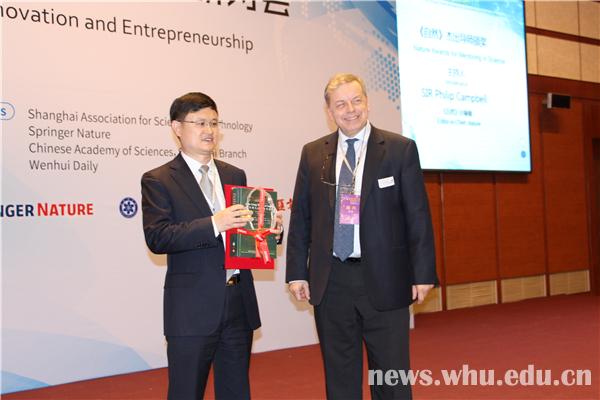Five prominent Chinese scientists, including CAS fellow Professor Shu Hongbing of Wuhan University, received the 2015 Nature Award for Mentoring in Science at the 2015 International Forum: From Research to Innovation and Entrepreneurship.

Cao Xuetao, President of the Chinese Academy of Medical Sciences and Deng Xingwang, Dean of the School of Advanced Agricultural Sciences at Peking University, were jointly presented with the Lifetime Achievement Award in Northern China. Chen Hongyuan, Director of the Institute of Analytical Science and the Institute of Chemical Biology at Nanjing University was honored the Lifetime Achievement Award in Southern China. Shi Yigong, Dean of the School of Life Sciences at Tsinghua University received the Mid-career Award in Northern China. Shu Hongbing, Dean of Life Sciences and Vice President for Research and Graduate Studies at Wuhan University was conferred the Mid-career Award in Southern China.
As a leading international scientific journal, Nature emphasizes on the importance of inspiring young scientists. It launched the annual Nature Award for Mentoring in Science to recognize outstanding scientific mentorship in 2005. The awards focus on a specific country or countries every year and this year goes to China.
Editor-in-Chief of Nature, Philip Campbell, said: "In an era where laboratories are under great pressure to be competitive, it is essential that they maintain the technical robustness and ethical integrity of their science, while also empowering creativity. Thus the mentoring of young researchers has never been more important. And good mentoring by laboratory heads is not a skill that can be taken for granted."
Mid-career Award recipient Professor Shu made major contributions to elucidation of the molecular mechanisms of inflammation and innate antiviral immune responses. His group focuses on the tumor necrosis factor (TNF) and interleukin 1 (IL-1)-triggered signaling, apoptosis and inflammatory responses and pattern-recognition and innate antiviral immune responses.
“It is a great honor to win this award,” said Professor Shu after the ceremony. “Cultivating outstanding students is the first priority to a teacher.” The Nature Award for Mentoring is the recognition of his contribution to education. In 2011, Professor Shu was selected as Top 10 Best Mentors in WHU and he placed the trophy in the most prominent position in his office.
Professor Shu left all the good conditions for scientific research in the U.S. behind in 2005 and decided to continue his work in China. As the Dean of Life Sciences, he spares no effort to foster elites and encourage scientific research. He then became the Vice-President of WHU and continued to devote himself to the cause of education and scientific research but he never forgets his role as a teacher.
39 excellent students has received mentoring in Professor Shu’s lab and 3 of them won the National Award for Doctorial Dissertation. Most of his students become professors in Universities and Scientific Institutions.
To Professor Shu’s students, he is both a strict teacher and a good teacher. Shu never allows his group to have no dream or ambition; to be dishonest; to be lazy and be forced to work; to be easily beaten by difficulties and failure and have no persistence; to only think of themselves rather than to cooperate; to have no interest on researches; to read no literature, and to have no critical thinking.
Professor Shu encourages and inspires his students with his own experience. “You might not be smart enough, but you shouldn’t be lazy or inattentive.” Shu said to his students, “You have to earn it instead of snatching it.”
Professor Shu thinks a lot about how to cultivate innovative talents. “I believe that even soil can be steeled into bricks.” For him, the most important thing is to never give up on students. Teachers should inspire their students to explore the unknown world and provide them with strict trainings. Students should have a critical, academically free and cooperative atmosphere for research and study.
“He is a very responsible and diligent mentor,” said Professor Shu’s students. Shu believed that a mentor should always be cautious with his or her behaviors because it would have great influence on the whole group and the future of every student. He is always the first to come and the last to leave even during holidays. His students all set him as their role model.
Qin Yue, one of Professor Shu’s students , said: “I was puzzled and anxious when I got my master degree and I didn’t know what I can do after graduation. Professor Shu then had a long conversation with me about my future plan. He admitted me to continue my internship in SHU LAB and study for my doctoral degree. Professor Shu is our example. He is hard-working, rigorous, and he never stop pursuing and exploring. He always knows what we’re capable of and what our weaknesses are. He helps us a lot.”
Zhang Yu, another student of Professor Shu, said in his doctoral thesis: “Professor Shu devoted himself to his dream. He can point out which sentence is logically untenable, which paragraph is not well-developed and which punctuation mark doesn’t fit. His cautiousness and proficiency impressed all of his students.”
(Rewritten by Zihan Song, Edited by Yinglun Liu & Sijia Hu)